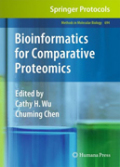
With the rapid development of proteomic technologies in the life sciences andin clinical applications, many bioinformatics methodologies, databases, and software tools have been developed to support comparative proteomics study. In Bioinformatics for Comparative Proteomics, experts in the field highlight the current status, challenges, open problems, and future trends for developing bioinformatics tools and resources for comparative proteomics research in order to deliver a definitive reference providing both the breadth and depth needed on the subject. Structured in three major sections, this detailed volume covers basic bioinformatics frameworks relating to comparative proteomics, bioinformatics databases and tools for proteomics data analysis, and integrated bioinformatics systems and approaches for studying comparative proteomics in the systems biology context. Written for the highly successful Methods in Molecular Biology™ series, the contributions in this book provide the meticulous, step-by-step description and implementation advice that is crucial for getting optimal results in the lab. Comprehensive and easy-to-use, Bioinformatics for Comparative Proteomics serves all readers who wish to learn about state-of-the-art bioinformatics databases and tools, novel computational methods and future trends in proteomics data analysis, and comparative proteomics in systems biology.Contains state-of-the-art bioinformatics databases and tools, novel computational methods and future trends in proteomics data analysis Features comparative proteomics in systems biology Presents material in an interdisciplinary fashion applicable to biotech and pharmaceutical scientists as well as biological,medical, and computational scientists and engineers INDICE: Protein Bioinformatics Databases and Resources.- A Guide to UniProt for Protein Scientists.- InterPro Protein Classification.- Reactome Knowledgebase of Human Biological Pathways and Processes.- eFIP: A Tool for Mining Functional Impact of Phosphorylation from Literature.- A Tutorial on Protein Ontology Resources for Proteomic Studies.- Structure-Guided Rule-Based Annotation of Protein Functional Sites in UniProt Knowledgebase.- Modeling Mass Spectrometry-Based Protein Analysis.- Protein Identification from Tandem Mass Spectra by Database Searching.- LC-MS Data Analysis for Differential Protein ExpressionDetection.- Protein Identification by Spectral Networks Analysis.- Software Pipeline and Data Analysis for MS/MS Proteomics: The Trans-Proteomic Pipeline.-Analysis of High-Throughput ELISA Microarray Data.- Proteomics Databases and Repositories.- Preparing Molecular Interaction Data for Publication.- Submitting Proteomics Data to PRIDE Using PRIDE Converter Automated Data Integration and Determination of Posttranslational Modi?cations with the Protein Inference Engine.- An Integrated Top-Down and Bottom-Up Strategy for Broadly Characterizing Protein Isoforms and Modifications.- Phosphoproteome Resource for Systems Biology Research.- Protein-Centric Data Integration for Functional Analysis ofComparative Proteomics Data.- Integration of Proteomic and Metabolomic Profiling as well as Metabolic Modeling for the Functional Analysis of Metabolic Networks.- Time Series Proteome Profiling.
- ISBN: 978-1-60761-976-5
- Editorial: Humana
- Encuadernacion: Cartoné
- Páginas: 365
- Fecha Publicación: 29/10/2010
- Nº Volúmenes: 1
- Idioma: Inglés
